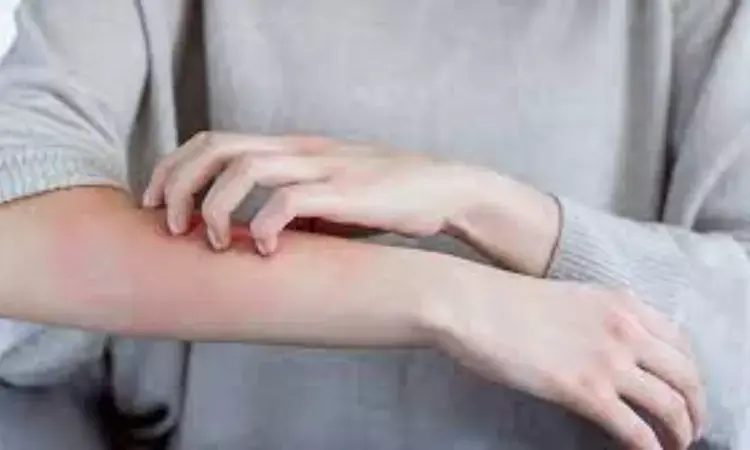- Home
- Medical news & Guidelines
- Anesthesiology
- Cardiology and CTVS
- Critical Care
- Dentistry
- Dermatology
- Diabetes and Endocrinology
- ENT
- Gastroenterology
- Medicine
- Nephrology
- Neurology
- Obstretics-Gynaecology
- Oncology
- Ophthalmology
- Orthopaedics
- Pediatrics-Neonatology
- Psychiatry
- Pulmonology
- Radiology
- Surgery
- Urology
- Laboratory Medicine
- Diet
- Nursing
- Paramedical
- Physiotherapy
- Health news
- Fact Check
- Bone Health Fact Check
- Brain Health Fact Check
- Cancer Related Fact Check
- Child Care Fact Check
- Dental and oral health fact check
- Diabetes and metabolic health fact check
- Diet and Nutrition Fact Check
- Eye and ENT Care Fact Check
- Fitness fact check
- Gut health fact check
- Heart health fact check
- Kidney health fact check
- Medical education fact check
- Men's health fact check
- Respiratory fact check
- Skin and hair care fact check
- Vaccine and Immunization fact check
- Women's health fact check
- AYUSH
- State News
- Andaman and Nicobar Islands
- Andhra Pradesh
- Arunachal Pradesh
- Assam
- Bihar
- Chandigarh
- Chattisgarh
- Dadra and Nagar Haveli
- Daman and Diu
- Delhi
- Goa
- Gujarat
- Haryana
- Himachal Pradesh
- Jammu & Kashmir
- Jharkhand
- Karnataka
- Kerala
- Ladakh
- Lakshadweep
- Madhya Pradesh
- Maharashtra
- Manipur
- Meghalaya
- Mizoram
- Nagaland
- Odisha
- Puducherry
- Punjab
- Rajasthan
- Sikkim
- Tamil Nadu
- Telangana
- Tripura
- Uttar Pradesh
- Uttrakhand
- West Bengal
- Medical Education
- Industry
Dealcoholized Muscadine Wine reduced oxidative stress and improve skin health among females

Researchers have made a discovery in the field of dermatology, uncovering a potential solution to combat skin aging. A new study, presented at the NUTRITION 2023, reveals that dealcoholized muscadine wine (DMW) has a significant positive effect on skin conditions associated with aging. The research focused on the impact of DMW on inflammation, oxidative stress, and UVB-induced erythema in healthy females aged 40-67, employing a randomized, single-blinded, placebo-controlled, cross-over design.
The study, conducted by a team of dermatologists and nutritionists, followed seventeen healthy women aged 40-67, all with Fitzpatrick skin types 2 and 3. Participants were strictly advised to avoid Vaccinium products, botanical dietary supplements, and probiotic supplements during the study to minimize potential confounding factors.
The research commenced with a 7-day run-in period, during which participants were assigned to consume either 300 mL of DMW or a placebo for six weeks. Following a 21-day wash-out period, the participants switched to the opposite beverage for an additional six weeks.
Several skin parameters were measured at baseline and after each six-week period, including transepidermal water loss, elasticity, UVB-induced erythema, smoothness, and roughness, among others. Moreover, inflammatory and oxidative stress biomarkers in the blood were assessed using ELISA and colorimetric methods.
The results were striking. Consumption of DMW significantly reduced transepidermal water loss on the face, improved skin pH, and enhanced net elasticity compared to baseline levels. Gross elasticity, an important indicator of skin firmness, showed a significant increase after DMW consumption compared to the placebo.
On the forearm, DMW intake notably increased gross elasticity and net elasticity, while decreasing viscoelasticity, leading to smoother and less rough skin. In the blood, DMW consumption triggered an increase in glutathione peroxidase activity, a potent antioxidant, and reduced the levels of advanced glycation end products and matrix metalloprotease-9, both linked to skin aging.
While further research is needed to fully understand the mechanisms behind DMW's effects on the skin, these initial results offer hope for individuals seeking safe and effective ways to maintain youthful and healthy skin as they age.
Source:
Christman L. Dealcoholized muscadine wine improved skin health, reduced oxidative stress and inflammation in women in a randomized controlled trial. Presented at: NUTRITION; July 22-25, 2023; Boston
Neuroscience Masters graduate
Jacinthlyn Sylvia, a Neuroscience Master's graduate from Chennai has worked extensively in deciphering the neurobiology of cognition and motor control in aging. She also has spread-out exposure to Neurosurgery from her Bachelor’s. She is currently involved in active Neuro-Oncology research. She is an upcoming neuroscientist with a fiery passion for writing. Her news cover at Medical Dialogues feature recent discoveries and updates from the healthcare and biomedical research fields. She can be reached at editorial@medicaldialogues.in
Dr Kamal Kant Kohli-MBBS, DTCD- a chest specialist with more than 30 years of practice and a flair for writing clinical articles, Dr Kamal Kant Kohli joined Medical Dialogues as a Chief Editor of Medical News. Besides writing articles, as an editor, he proofreads and verifies all the medical content published on Medical Dialogues including those coming from journals, studies,medical conferences,guidelines etc. Email: drkohli@medicaldialogues.in. Contact no. 011-43720751


